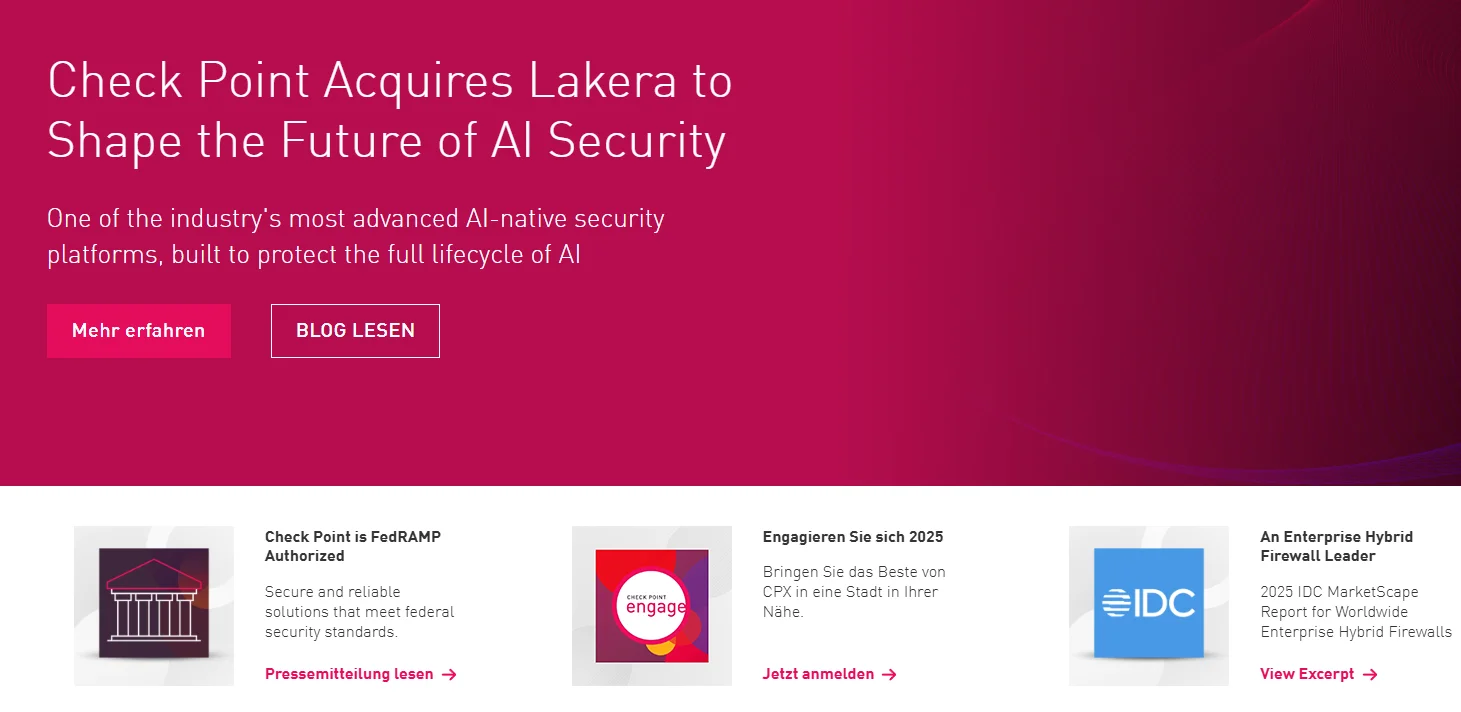| Auf der it-sa präsentierte Check Point seine Wachstumsstrategie im IT-Security-Markt mit hybridem SASE-Ansatz und präventiven Sicherheitslösungen. | At it-sa, Check Point presented its growth strategy for the IT security market, which includes a hybrid SASE approach and preventive security solutions. |
| Mit dem Dreiklang „Comprehensive, Consolidated & Collaborative“ baut Check Point seine Marktposition im IT-Security-Bereich aus. Andreas Kersting, Channel Sales Director Central Europe, und Svenja Habenschaden, Head of Marketing DACH, erläuterten im Gespräch auf der it-sa in Nürnberg, wie die Akquisitionen von Veriti und Lakera das Portfolio stärken und weshalb die konsequente Channel-Strategie mit Fokus auf MSSPs der Schlüssel zum Erfolg ist. Hybrid-SASE-Architektur statt reiner Cloud-Lösungen und präventive Sicherheit mit niedrigsten CVE-Zahlen der Branche. Mit der Übernahme von Veriti und Lakera sowie verstärkten Investitionen in MSSP-Partner positioniert sich Check Point für die Zukunft.
Der Anbieter hat sein Portfolio breit aufgestellt und deckt alle relevanten Bereiche ab: von Cloud-Security über Firewall-Lösungen bis hin zu E-Mail-Sicherheit und KI-gestützten Technologien. Das zentrale Versprechen: eine einheitliche Sicherheitsplattform als Architektur. Positive Messebilanz und neue Schwerpunkte Die it-sa verlief für Check Point äußerst positiv. Der Messeauftritt war größer als in den Vorjahren und bot Raum, das gesamte Portfolio zu präsentieren. Besonders im Fokus standen dabei SASE-Lösungen (Secure Access Service Edge) und External Risk Management. Im Gespräch mit Kunden und Partnern wurden neue Themen diskutiert und konkrete Akquisitionsmöglichkeiten ausgelotet. Eine wichtige Neuigkeit ist der Zukauf von Veriti im Mai 2025. Veriti gilt als Pionier in der Kategorie Preemptive Exposure Management (PEM) und ergänzt das Check Point-Angebot um proaktive Sicherheitsansätze. Auch strategische Partnerschaften wie die mit Bechtle, die eine eigene Nerfuse-Lösung entwickelt haben, unterstreichen die Integrationsfähigkeit der Check Point-Plattform. Außerdem neu ist der Kauf von Lakera im September 2025, das 2021 in Zürich von David Haber, Matthias Kraft und Mateo Rojas-Carulla gegründet wurde. Lakera fokussiert sich speziell auf KI-native Umgebungen mit KI-Forschungs- und Entwicklungszentren in Zürich und San Francisco. Seine Flaggschiff-Lösungen Lakera Red und Lakera Guard bieten Bewertungen der Sicherheitslage vor der Bereitstellung und Echtzeit-Durchsetzung während der Laufzeit, um LLMs, KI-Agenten und multimodale Workflows zu schützen. Die Plattform von Lakera kombiniert fortschrittlichen Laufzeitschutz mit kontinuierlichem Red Teaming, unterstützt durch Gandalf, einem Anbieter von adversarial AI-Netzwerken. Dieser einzigartige Ansatz gewährleistet eine sich ständig weiterentwickelnde Verteidigung, die neuen KI-Bedrohungen immer einen Schritt voraus ist und Unternehmen die Sicherheit gibt, KI sicher und in großem Umfang einzusetzen. Channel-Strategie im Wandel Check Point verfolgt eine konsequente 100-Prozent-Channel-Strategie. „Partner können sich darauf verlassen, dass wir voll auf sie setzen“, betont Andreas Kersting. Dabei liegt ein besonderer Fokus auf Managed Security Service Providern (MSSPs), über die vor allem das KMU-Geschäft erschlossen wird. Dieser Bereich ist noch ausbaufähig, wächst aber schnell. Um kleinere Partner besser einzubinden, arbeitet Check Point eng mit Distributoren wie Westcon, Infinigate und Arrow zusammen – alle Beteiligten zeigen sich mit der Zusammenarbeit sehr zufrieden. Neue Partner werden gezielt unterstützt: Check Point nimmt ihnen die Komplexität ab und investiert verstärkt in Wissensaufbau. Erfolgreiche MSSPs finden oft über eine vertikale Nische ihren Einstieg. Die Schulungsinvestitionen wurden deutlich erhöht, um das Partnernetzwerk fit für aktuelle Herausforderungen zu machen. KI als Schutzschild und Risiko Ein zentrales Produktthema ist die Threat Cloud AI, die Angriffe erkennt und als intelligente Schutzschicht über dem gesamten Portfolio arbeitet. Die Akquisition von Laquera unterstützt den Schutz von Large Language Models (LLMs). Check Point hat dazu ein innovatives Trainingsprogramm mit spielerischem Ansatz entwickelt, das Verständnis für LLM-Gefahren schafft. Die Software zeigt, wie Content Injection funktioniert und wie sich sensitive Informationen schützen lassen. Hybrid als Wettbewerbsvorteil Ein wesentliches Alleinstellungsmerkmal von Check Point liegt in der Prävention: Das Unternehmen weist die geringste Anzahl an CVEs (Common Vulnerabilities and Exposures) vor und ist entsprechend zertifiziert. Anders als viele Wettbewerber, die ausschließlich auf Cloud-Lösungen setzen, verfolgt Check Point einen hybriden SASE-Ansatz. Dieser erweist sich als kostengünstiger und bietet durch Lösungen direkt auf dem Endgerät niedrige Latenzen – ein entscheidender Vorteil für Performance-kritische Anwendungen. Die Marktposition unterstreichen auch sehr gute Platzierungen in den Gartner Magic Quadrants und Forrester Wave Reports. Für die kommende Zeit plant Check Point weitere Veranstaltungen, wobei Details noch nicht spruchreif sind. Höhepunkte bleiben die it-sa sowie das hauseigene CPX Event mit den Distributoren. Der Fokus liegt künftig verstärkt auf regionalen Aktivitäten, um näher an Kunden und Partnern zu sein. Weitere Zukäufe zur Portfolio-Erweiterung sind in Planung. |
With the trilogy „Comprehensive, Consolidated, and Collaborative,“ Check Point is strengthening its position in the IT security sector. In an interview at it-sa in Nuremberg, Andreas Kersting, Channel Sales Director for Central Europe, and Svenja Habenschaden, Head of Marketing for DACH, explained how the acquisitions of Veriti and Lakera strengthen the portfolio and why a consistent channel strategy focused on MSSPs is key to success. Check Point offers hybrid SASE architecture instead of pure cloud solutions and preventive security with the lowest CVE numbers in the industry. Through the acquisitions of Veriti and Lakera, as well as increased investments in MSSP partners, Check Point is positioning itself for the future.
The provider has a broad portfolio that covers all relevant areas, including cloud security, firewall solutions, email security, and AI-based technologies. The central promise is a unified security platform architecture. Positive Experience it-sa was an extremely positive experience for Check Point. The trade fair booth was larger than in previous years and offered space to present the entire portfolio. There was a particular focus on SASE (Secure Access Service Edge) solutions and external risk management. Discussions with customers and partners explored new topics and concrete acquisition opportunities. One important development is the acquisition of Veriti in May 2025. Veriti is a pioneer in Preemptive Exposure Management (PEM) and will complement the Check Point offering with its proactive security approaches. Strategic partnerships, such as the one with Bechtle, which developed its own Nerfuse solution, underscore the Check Point platform’s interoperability. Another new development is the acquisition of Lakera, founded in Zurich in 2021 by David Haber, Matthias Kraft, and Mateo Rojas-Carulla, in September 2025. Lakera specializes in AI-native environments and has AI research and development centers in Zurich and San Francisco. Its flagship solutions, Lakera Red and Lakera Guard, provide security assessments prior to deployment and real-time enforcement during runtime to safeguard LLMs, AI agents, and multimodal workflows. Lakera’s platform combines advanced runtime protection with continuous red teaming and is supported by Gandalf, a provider of adversarial AI networks. This unique approach ensures a defense that constantly evolves and is always one step ahead of new AI threats, giving companies the security they need to safely use AI on a large scale. Channel Strategy going forward Check Point is pursuing a consistent 100% channel strategy. „Partners can rely on us to fully commit to them,“ emphasizes Andreas Kersting. There is a special focus on Managed Security Service Providers (MSSPs), through which the SME business is primarily developed. This area is still growing, but has room for expansion. To better integrate smaller partners, Check Point collaborates closely with distributors such as Westcon, Infinigate, and Arrow — all of whom are very satisfied with the partnership. New partners receive specific support: Check Point simplifies processes and invests heavily in knowledge building. Successful MSSPs often find their entry point through a vertical niche. Training investments have increased significantly to prepare the partner network for current challenges. AI as a Protective Shield and Risk A central product theme is Threat Cloud AI, which recognizes attacks and functions as an intelligent protective layer over the entire portfolio. Check Point’s acquisition of Lakera supports the protection of Large Language Models (LLMs). Check Point has developed an innovative training program with a playful approach to create understanding of LLM dangers. The software demonstrates how content injection works and how to protect sensitive information. Hybrid as a Competitive Advantage A significant unique selling point of Check Point is its prevention capabilities. The company has the lowest number of CVEs (common vulnerabilities and exposures) and is certified accordingly. Unlike many competitors who rely solely on cloud solutions, Check Point uses a hybrid SASE approach. This approach is cost-effective and offers low latency through solutions directly on the endpoint — a decisive advantage for performance-critical applications. Check Point’s strong market position is also underscored by its excellent placements in Gartner Magic Quadrants and Forrester Wave Reports. Check Point plans to hold more events in the future, although details are not yet available. Highlights include it-sa and the CPX event with distributors. In the future, the focus will be on regional activities to be closer to customers and partners. Further acquisitions to expand the portfolio are also planned. |

Dr. Jakob Jung ist Chefredakteur Security Storage und Channel Germany. Er ist seit mehr als 20 Jahren im IT-Journalismus tätig. Zu seinen beruflichen Stationen gehören Computer Reseller News, Heise Resale, Informationweek, Techtarget (Storage und Datacenter) sowie ChannelBiz. Darüber hinaus ist er für zahlreiche IT-Publikationen freiberuflich tätig, darunter Computerwoche, Channelpartner, IT-Business, Storage-Insider und ZDnet. Seine Themenschwerpunkte sind Channel, Storage, Security, Datacenter, ERP und CRM.
Dr. Jakob Jung is Editor-in-Chief of Security Storage and Channel Germany. He has been working in IT journalism for more than 20 years. His career includes Computer Reseller News, Heise Resale, Informationweek, Techtarget (storage and data center) and ChannelBiz. He also freelances for numerous IT publications, including Computerwoche, Channelpartner, IT-Business, Storage-Insider and ZDnet. His main topics are channel, storage, security, data center, ERP and CRM.
Kontakt – Contact via Mail: jakob.jung@security-storage-und-channel-germany.de
